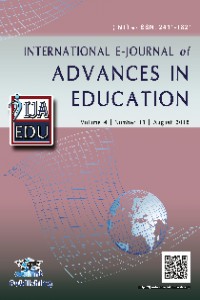Abstract
References
- Bogdan, R. & Biklen, S. (2007). Qualitative research for education: An introduction to theory and practice. Needham Heights, MA: Allyn & Bacon. Bednar, E. D. & Fisher, T. D. (2003). Peer referencing in adolescent decision making as a function of perceived parenting style. Adolescence, 38(152), 607 – 621. Brown, J., Abdallah, S.S., Ng, R. (2011). Decision making styles East and West: Is it time to move beyond cross-cultural research. International Journal of Sociology and Anthropology, 3(12), 452- 459 Fuligni, A. J., & Eccles, J. S. (1993). Perceived parent-child relationships and early adolescents' orientation toward peers. Developmental Psychology, 29, 622-632. Jacobs, J. E., & Ganzel, A. K. (1993). Decision-making in adolescence: Are we asking the wrong question? Advances in Motivation and Achievement, 8, 1-31. Leena Mangrulkar, (2003). Life Skills Approach to Child and Adolescent Healthy Human Development, Health and Human Development Programs (HHD). Life Skills Education, CBSE (2013). Retrieved from, www.cbse.nic.in/cce/life_skills_cce.pdf Mann, L., Harmoni, R., & Power, C. (1989). Adolescent decision-making: The development of competence. Journal of Adolescence, 12, 265-278. Rajni Dhingraa , Kirti Singh Chauhan (2017). Assessment of Life-Skills of Adolescents in Relation to Selected Variables. International Journal of Advanced Research (2015), Volume 3, Issue 2, 788-794. Strauss, S. S., & Clarke, B. A. (1992). Decision-making patterns in adolescent mothers. Image: Journal of Nursing Scholarship, 24, 69-74. Schvaneveldt, J. D., & Adams, G. R. (1983). Adolescents and the decision-making process. Theory Into Practice, 22, 98-104. Worell, J. & Danner, F. (1989). The adolescent as decision-maker: Applications to development and education. San Diego, CA: Academic Press, Inc. Yadav P, Iqbal N (2009). Impact of Life Skill Training on Self-esteem, Adjustment and Empathy among Adolescents. Journal of the Indian Academy of Applied Psychology, (35) Special Issue, 61-70. Retrieved from http://medind.nic.in/jak/t09/s1/jakt09s1p61.pdf Websites https://www.questia.com/library/journal/1P3-3738627901/life-skills-among-adolescents-a-study-of-sangrur http://www.rajournals.in/images/ijararticle/v2-i5/3rajar.pdf https://cals.arizona.edu/sfcs/cyfernet/nowg/sc_decision.html
Abstract
Keywords
Life skills education programme decision making skill low- socio- economic status marginalized students
References
- Bogdan, R. & Biklen, S. (2007). Qualitative research for education: An introduction to theory and practice. Needham Heights, MA: Allyn & Bacon. Bednar, E. D. & Fisher, T. D. (2003). Peer referencing in adolescent decision making as a function of perceived parenting style. Adolescence, 38(152), 607 – 621. Brown, J., Abdallah, S.S., Ng, R. (2011). Decision making styles East and West: Is it time to move beyond cross-cultural research. International Journal of Sociology and Anthropology, 3(12), 452- 459 Fuligni, A. J., & Eccles, J. S. (1993). Perceived parent-child relationships and early adolescents' orientation toward peers. Developmental Psychology, 29, 622-632. Jacobs, J. E., & Ganzel, A. K. (1993). Decision-making in adolescence: Are we asking the wrong question? Advances in Motivation and Achievement, 8, 1-31. Leena Mangrulkar, (2003). Life Skills Approach to Child and Adolescent Healthy Human Development, Health and Human Development Programs (HHD). Life Skills Education, CBSE (2013). Retrieved from, www.cbse.nic.in/cce/life_skills_cce.pdf Mann, L., Harmoni, R., & Power, C. (1989). Adolescent decision-making: The development of competence. Journal of Adolescence, 12, 265-278. Rajni Dhingraa , Kirti Singh Chauhan (2017). Assessment of Life-Skills of Adolescents in Relation to Selected Variables. International Journal of Advanced Research (2015), Volume 3, Issue 2, 788-794. Strauss, S. S., & Clarke, B. A. (1992). Decision-making patterns in adolescent mothers. Image: Journal of Nursing Scholarship, 24, 69-74. Schvaneveldt, J. D., & Adams, G. R. (1983). Adolescents and the decision-making process. Theory Into Practice, 22, 98-104. Worell, J. & Danner, F. (1989). The adolescent as decision-maker: Applications to development and education. San Diego, CA: Academic Press, Inc. Yadav P, Iqbal N (2009). Impact of Life Skill Training on Self-esteem, Adjustment and Empathy among Adolescents. Journal of the Indian Academy of Applied Psychology, (35) Special Issue, 61-70. Retrieved from http://medind.nic.in/jak/t09/s1/jakt09s1p61.pdf Websites https://www.questia.com/library/journal/1P3-3738627901/life-skills-among-adolescents-a-study-of-sangrur http://www.rajournals.in/images/ijararticle/v2-i5/3rajar.pdf https://cals.arizona.edu/sfcs/cyfernet/nowg/sc_decision.html
Details
| Primary Language | English |
|---|---|
| Journal Section | Articles |
| Authors | |
| Publication Date | August 27, 2018 |
| Submission Date | June 3, 2018 |
| Published in Issue | Year 2018Volume: 4 Issue: 11 |
Published and Sponsored by OCERINT International © 2015 - 2025
Contact: ijaedujournal@hotmail.com
International E-Journal of Advances in Education by IJAEDU is licensed under a Creative Commons Attribution-NonCommercial 4.0 International License. Permissions beyond the scope of this license may be available at http://ijaedu.ocerintjournals.org



